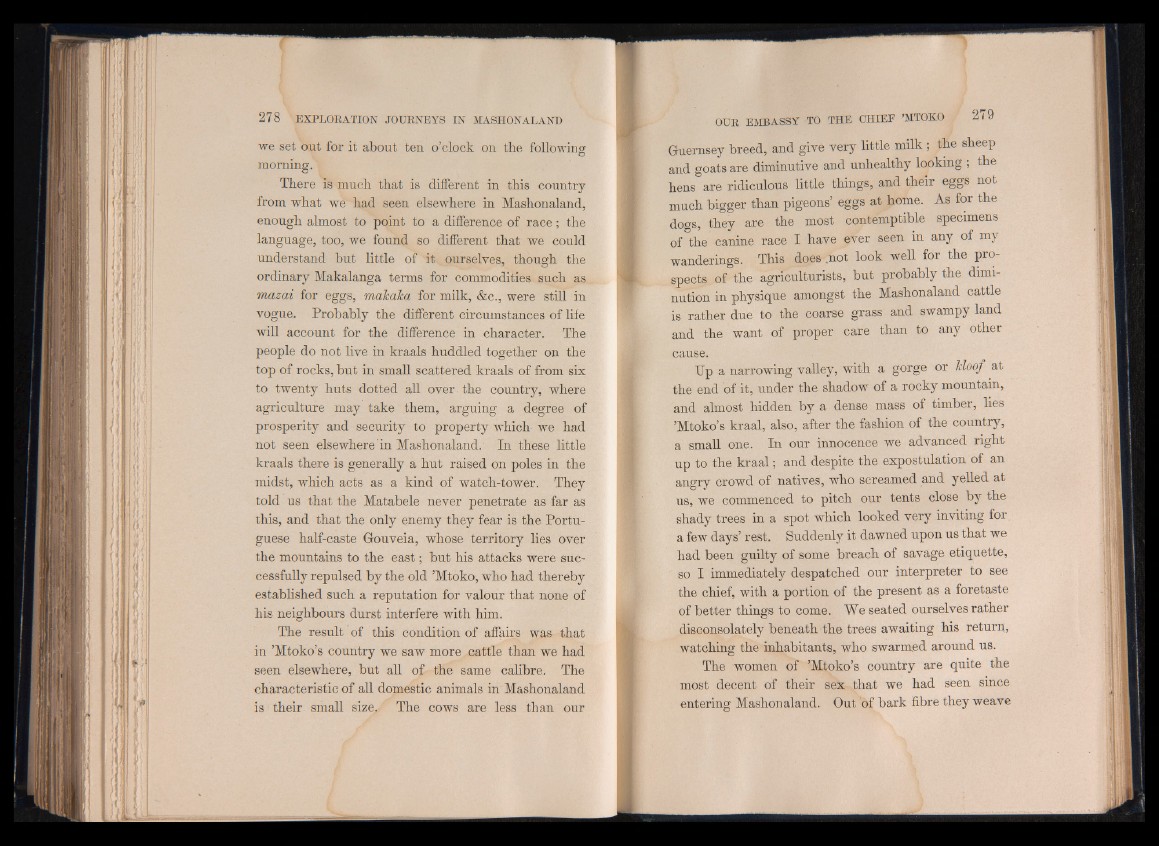
2 7 8 EXPLORATION JOURNEYS IN MASHONALAND
we set out for it about ten o’clock on the followingD
morning.
There is much that is different in this country
from what we had seen elsewhere in Mashonaland,
enough almost to point to a difference of race; the
language, too, we found so different that we could
understand but little of it ourselves, though the
ordinary Makalanga terms for commodities such as
mazai for eggs, maJcaJca for milk, &c., were still in
vogue. Probably the different circumstances of life
will account for the difference in character. The
people do not live in kraals huddled together on the
top of rocks, but in small scattered kraals of from six
to twenty huts dotted all over, the country, where
agriculture may take them, arguing a degree of
prosperity and security to property which we had
not seen elsewhere in Mashonaland. In these little
kraals there is generally a hut raised on poles in the
midst, which acts as a kind of watch-tower. They
told us that the Matabele never penetrate as far as
this, and that the only enemy they fear is the Portuguese
half-caste Gouveia, whose territory lies over
the mountains to the east; but his attacks were successfully
repulsed by the old ’Mtoko, who had thereby
established such a reputation for valour that none of
his neighbours durst interfere with him.
The result of this condition of affairs was that
in ’Mtoko’s country we saw more cattle than we had
seen elsewhere, but all of the same calibre. The
characteristic of all domestic animals in Mashonaland
is their small size. The cows are less than our
Guernsey breed, and give very little milk ; the sheep
and goats are diminutive and unhealthy looking , the
hens are ridiculous little things, and their eggs not
much bigger than pigeons’ eggs at home. As for the
dogs, they are the most contemptible specimens
of the canine race I have ever seen in any of my
wanderings. This does .not look well for the prospects
of the agriculturists, but probably the diminution
in physique amongst the Mashonaland cattle
is rather due to the coarse grass and swampy land
and the want of proper care than to any other
cause.
Up a narrowing valley, with a gorge or Hoof at
the end of it, under the shadow of a rocky mountain,
and almost hidden by a dense mass of timber, lies
’Mtoko’s kraal, also, after the fashion of the country,
a small one. In our innocence we advanced right
up to the kraa l; and despite the expostulation of an
angry crowd of natives, who screamed and yelled at
us, we commenced to pitch our tents close by the
shady trees in a spot which looked very inviting for
a few days’ rest. Suddenly it dawned upon us that we
had been guilty of some breach of savage etiquette,
so I immediately despatched our interpreter to see
the chief, with a portion of the present as a foretaste
of better things to come. We seated ourselves rather
disconsolately beneath the trees awaiting his return,
watching the inhabitants, who swarmed around us.
The women of ’Mtoko’s country are quite the
most decent of their sex that we had seen since
entering Mashonaland. Out of bark fibre they weave